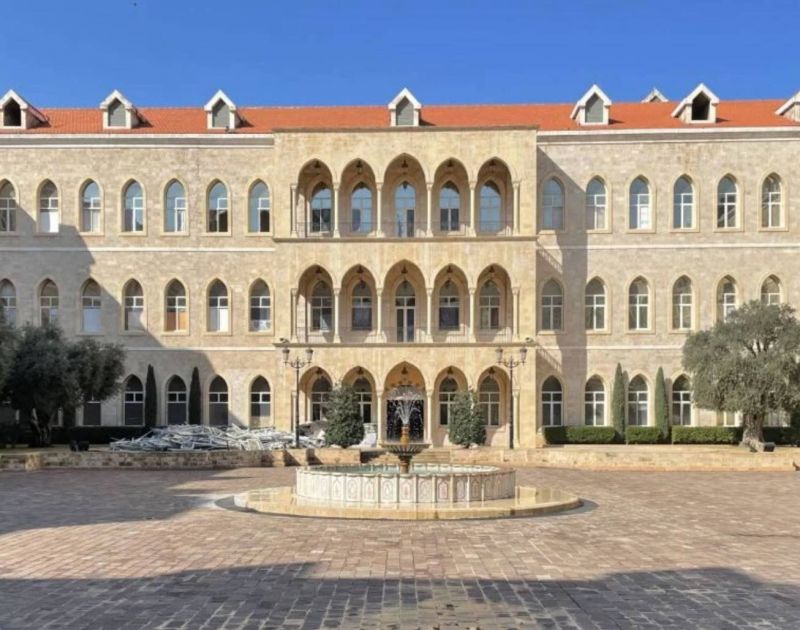
A facade of the Grand Serail in Beirut. (Credit: PHB)
According to a recent decision reported on Tuesday by LBCI, the Council of State ruled that the appeal filed by the Association des Banques du Liban (ABL) against a decree issued by the government, recommending the removal of a portion of the Banque du Liban (BDL)’s foreign currency liabilities from its balance sheet, is admissible.
In practical terms, this ruling pertains to a substantial amount of funds, reaching tens of billions of dollars and consisting of deposits and certificates of deposit that banks have entrusted to BDL over the years. However, due to the limited strength of its foreign currency reserves, BDL is currently unable to fully repay these amounts. Its liquid assets amount to less than $10 billion, while the state’s default on $5 billion in Eurobonds and the presence of nearly $18 billion in gold reserves further contributes to the challenge.
According to the ruling, this decision, dated May 18, pertains to the admissibility of an appeal that was filed almost a year ago, on June 28, 2022.
The appeal challenged a decree issued on May 20, 2022, which coincided with the resignation of Najib Mikati's government, leaving it responsible for handling current affairs at the time.
Debate on the merits of the procedure
According to Akram Azouri, the lawyer representing ABL, such delays are typical for a decision from the highest administrative court. He explained that they have just been notified of the ruling, which accounts for the month-long delay between the decision date and its public announcement.
Azouri emphasized that despite addressing the admissibility of the appeal, the significance of the ruling is substantial. It means that the Council of State has recognized its authority to review the validity of measures included in governmental actions.
Governmental actions are typically immune from jurisdictional challenges, meaning they cannot be contested before a national court.
According to a legal expert, who prefers to remain unidentified for professional reasons, the Council of State’s reasoning behind the ruling is that it considered the issue of BDL’s commitments to the banks as a “grievance.” In other words, it determined that this matter directly affected the legal status of the banks and depositors, thus warranting the Council of State’s retrospective review and control.
The legal source also highlighted that the disputed decision merely outlined the framework of a comprehensive recovery strategy. It aimed to establish guidelines for the enactment of various laws and regulations intended to address capital controls, bank restructuring, and the allocation of the country’s losses.
However, the legal source criticized the fact that these laws have yet to be implemented, which significantly diminishes the relevance of the entire procedure initiated by ABL.
The decision to reduce “a significant portion” of BDL’s dollar-denominated liabilities to banks, primarily consisting of deposits and certificates of deposit that the banks registered but could not fully repay, was a crucial component of the recovery plan formulated by the cabinet during that period.
The measure to address the BDL’s balance sheet by reducing its liabilities was consistent with the reforms outlined by the International Monetary Fund (IMF) in the preliminary Staff Level Agreement signed between the IMF and the Lebanese authorities in April 2022. This step aimed to align with the recommendations put forth by the IMF.
However, the government’s limited communication on this matter makes it challenging to provide a comprehensive update on the progress of the IMF-recommended projects.
The banks argue that both the state and BDL bear responsibility for their struggle to fulfill their obligations to depositors since the onset of the crisis in 2019. They downplay the fact that they received compensation for their investments in BDL and Lebanese public debt over the years.
Deputy Prime Minister Saade Chami, a former IMF executive, did not respond to our request for comment.
Lebanon has been grappling with the economic crisis for nearly four years now and determining how to distribute the accumulated losses of over $70 billion between the State, BDL and the banks is a crucial aspect of any recovery endeavor. The distribution of losses poses a significant challenge to the overall recovery process.
This article war originally published in French in L'Orient-Le Jour. Translation by Sahar Ghoussoub.